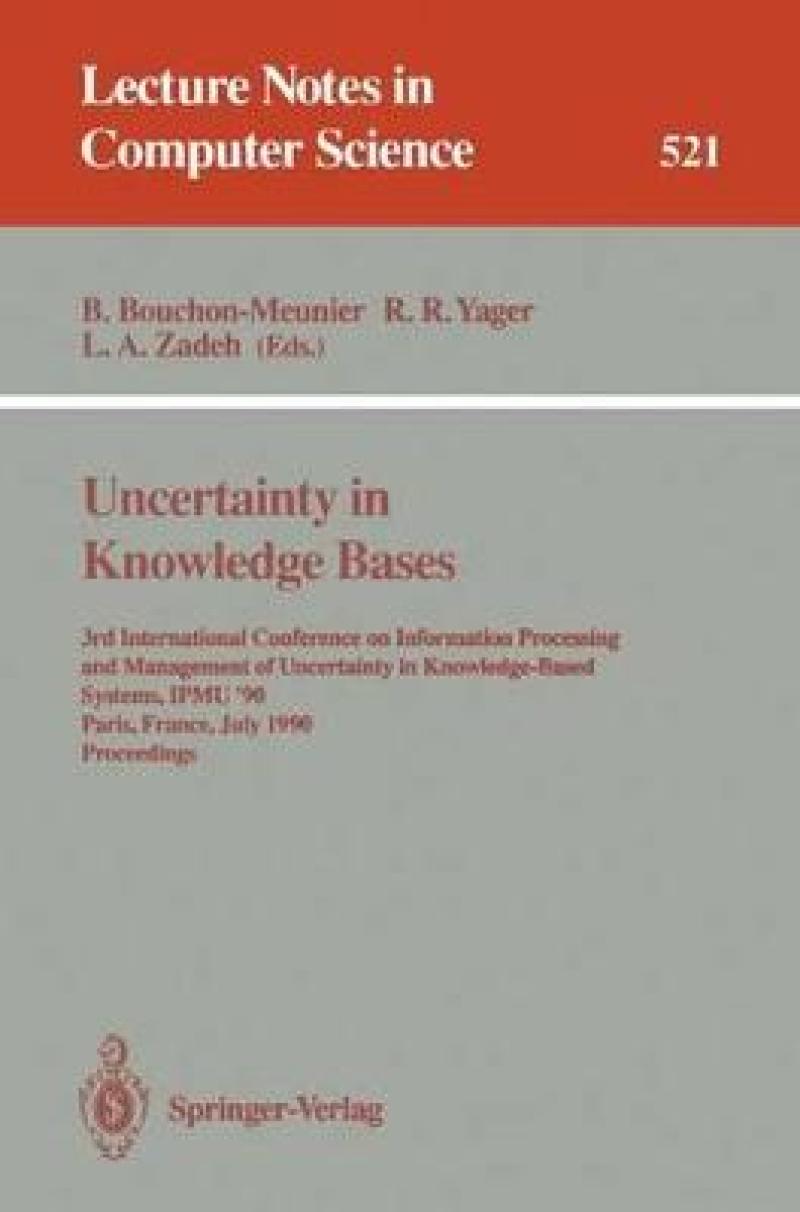The management and processing of uncertain information has
shown itself to be a crucial issue in the development of
intelligent systems, beginning withits appearance in the
such systems as Mycin and Prospector. The papers in this
volume reflect the current range of interests or researchers
in thefield. Currently, the major approaches to uncertainty
include fuzzy set theory, probabilistic methods,
mathematical theory of evidence, non-standardlogics such as
default reasoning, and possibility theory.
The initial part of the volume is devoted to papers dealing
with the foundations of these approaches, where recent
attempts have been made to develop systems combining
multiple approaches. A significant part of the book looks at
the management of uncertainty in a number of the
paradigmatic domainsof intelligent systems such as expert
systems, decision making, databases, image processing, and
reasoning networks.
The papers are extended versions of presentations at the
third international conference on information processing and
management of uncertainty in knowledge-based systems. The
proceedings of the two preceding IPMU conferences appear as
LNCS 286 and LNCS 313.
Les mer
The management and processing of uncertain information hasshown itself to be a crucial issue in the development ofintelligent systems, beginning withits appearance in thesuch systems as Mycin and Prospector.
Les mer
On Spohn's theory of epistemic beliefs.- Fast algorithms for Dempster-Shafer theory.- On the combination of information sources.- Application aspects of qualitative conditional independence.- A study of probabilities and belief functions under conflicting evidence: Comparisons and new methods.- Propagating belief functions through constraints systems.- Updating uncertain information.- Assessing multiple beliefs according to one body of evidence — Why it may be necessary, and how we might do it correctly.- Probabilistic default reasoning.- On knowledge representation in belief networks.- Stoss — A stochastic simulation system for Bayesian belief networks.- Conditional events with vague information in expert systems.- On representation of source reliability in weight of evidence.- An abstract mechanism for handling uncertainty.- A method to build membership functions.- Algebraic analysis of fuzzy indiscernibility.- On modelling fuzzy preference relations.- Conceptual conectivity analysis by means of fuzzy partitions.- Transitive solutions of relational equations on finite sets and linear lattices.- Generalized cardinal numbers and their ordering.- An interval-based approach for working with fuzzy numbers.- Beyond specificity.- About the logical interpretation of ambiguous inheritance hierarchies.- Nonmonotonic reasoning and modal logic, from negation as failure to default logic.- On the notion of uncertain belief revision systems.- Non-monotonic reasoning in a semantic network.- Inference in possibilistic hypergraphs.- Semantic evaluation in possibilistic logic application to min-max discrete optimisation problems.- Formalizing multiple-valued logics as institutions.- Empirical plausible reasoning by multiple-valued logic.- Time, tense, and relativity revisited.-Information and the mind-body problem.- A general information for fuzzy sets.- Information theory based on fuzzy (possibilistic) rules.- Measuring uncertainty given imprecise attribute values.- Discrimination by optimizing a local consistency criterion.- Minimum loss of information and image segmentation.- Towards a general theory of evidential reasoning.- A pragmatic way out of the maze of uncertainty measures.- Models for reasoning with multitype uncertainty in expert systems.- A hybrid belief system for doubtful agents.- How to reason with uncertain knowledge.- Computation and uncertainty in regulated synergetic machines.- Inductive learning from incomplete and imprecise examples.- Some algorithms for evaluating fuzzy relational queries.- Time and incompleteness in a deductive database.- An approach to the linguistic summarization of data.- Management of uncertainty in the attachment problem in natural language processing.- A topological approach to some cluster methods.- A fuzzy knowledge-based system for biomedical image interpretation.- Management of caotic systems with the model for the regulation of agonistic antagonistic couples.- Fuzzy multicriteria techniques: An application to transport planning.- Fuzzy logic approach to modelling in ecosystem research.- An application of fuzzy multi-criteria decision making for topological design of large networks.- A distance measure for decision making in uncertain domains.- Decisions and lack of precision in crop management: The role of processing both objects and procedures through semantic networks.- A neural network expert system with confidence measurements.- Dealing with uncertainty in a distributed expert system architecture.- The combinatorial neural network: A connectionist model for knowledge based systems.- Amedical decision aid based on a neural network model.- A fuzzy neuron based upon maximum entropy ordered weighted averaging.
Les mer
Springer Book Archives
Springer Book Archives
GPSR Compliance
The European Union's (EU) General Product Safety Regulation (GPSR) is a set of rules that requires consumer products to be safe and our obligations to ensure this.
If you have any concerns about our products you can contact us on ProductSafety@springernature.com.
In case Publisher is established outside the EU, the EU authorized representative is:
Springer Nature Customer Service Center GmbH
Europaplatz 3
69115 Heidelberg, Germany
ProductSafety@springernature.com
Les mer
Produktdetaljer
ISBN
9783540543466
Publisert
1991-09-11
Utgiver
Springer-Verlag Berlin and Heidelberg GmbH & Co. KG
Høyde
235 mm
Bredde
155 mm
Aldersnivå
Research, UP, P, 05, 06
Språk
Product language
Engelsk
Format
Product format
Heftet
Antall sider
614
